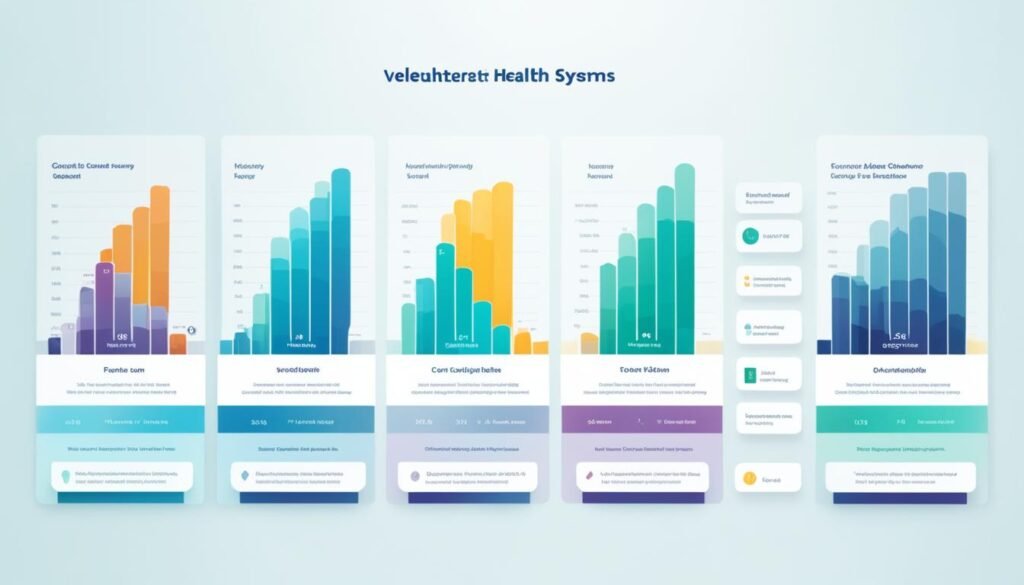Largest Hospital In Us When it comes to healthcare, size matters. In the vast landscape of the United States, there is one hospital that stands out as the largest in the country. Introducing AdventHealth Orlando, a beacon of excellence in healthcare located in Altamonte Springs, Florida. With an impressive bed count of 2,247, AdventHealth Orlando has established itself as the go-to destination for comprehensive medical services.
AdventHealth Orlando is part of the AdventHealth system, which operates a network of 52 hospitals across the nation. This expansive healthcare system ensures that patients receive top-notch care in every aspect of their medical journey. With a commitment to patient well-being and a mission to deliver holistic care, AdventHealth Orlando has become a trailblazer in the realm of healthcare.
Key Takeaways: Largest Hospital In Us
- AdventHealth Orlando is the largest hospital in the United States, with a bed count of 2,247.
- It is part of the AdventHealth system, which operates a network of 52 hospitals nationwide.
- The hospital is known for its exceptional medical services and commitment to patient care.
- The size of AdventHealth Orlando allows for comprehensive healthcare delivery.
- AdventHealth Orlando and the larger AdventHealth system embody the future of healthcare in the US.
Largest Health Systems in the US
When it comes to healthcare in the United States, there are several large health systems that stand out for their extensive reach and comprehensive services. These health systems play a crucial role in providing quality care to millions of patients across the nation. Let’s take a closer look at some of the largest health systems in the US:
- HCA Healthcare: With a network of 184 hospitals, HCA Healthcare is one of the largest health systems in the US. It operates in 21 states and the United Kingdom, delivering exceptional medical care to patients.
- CommonSpirit Health: CommonSpirit Health is another prominent health system with 137 hospitals spread across 21 states. It is committed to improving community health and has a strong presence in both urban and rural areas.
- Ascension Health: Ascension Health operates 139 hospitals in 24 states. The health system focuses on providing compassionate care and addressing the unique needs of each patient it serves.
- Universal Health Services: Universal Health Services is a well-known health system with 182 hospitals across the US. It offers a wide range of healthcare services and has a reputation for its commitment to patient satisfaction.
- Kaiser Permanente: Kaiser Permanente is a renowned integrated health system that combines insurance coverage with healthcare delivery. It operates 39 hospitals and serves more than 12 million members across eight states.
These health systems demonstrate their dedication to improving healthcare outcomes and providing accessible care in communities across the country. They are at the forefront of innovation, research, and patient-centered care.
Large health systems like HCA Healthcare and CommonSpirit Health are equipped with extensive resources, advanced technologies, and a vast network of medical professionals, enabling them to provide high-quality care to patients nationwide.
As health systems continue to grow and expand their reach, they are shaping the future of healthcare delivery in the US. The table below provides a comparison of these leading health systems based on the number of hospitals they operate:
| Health System | Number of Hospitals |
|---|---|
| HCA Healthcare | 184 |
| CommonSpirit Health | 137 |
| Ascension Health | 139 |
| Universal Health Services | 182 |
| Kaiser Permanente | 39 |
The table highlights the scale and reach of these health systems, showcasing their ability to provide comprehensive care in various regions. With their wide range of services and commitment to patient well-being, these health systems are instrumental in ensuring the delivery of quality healthcare across the US.
Next, we will explore the largest hospitals in the US based on bed count, providing insights into the facilities that play a significant role in meeting the healthcare needs of the population.
Largest Hospitals in the US

When it comes to the largest hospitals in the US, bed count plays a crucial role. These hospitals have a significant capacity to accommodate patients and provide top-notch medical services. Here are some of the largest hospitals in the country:
- Johns Hopkins Hospital – Baltimore, MD
- Mount Sinai Hospital – New York, NY
- Cleveland Clinic – Cleveland, OH
- Massachusetts General Hospital – Boston, MA
- Mayo Clinic – Rochester, MN
These hospitals not only boast a high number of hospital beds but also have consistently ranked among the top medical institutions in the US. Patients trust these hospitals for their expertise, cutting-edge treatments, and exceptional patient care.
Johns Hopkins Hospital
“We strive to provide the highest quality patient care, pushing boundaries in medical research and education.”
– Dr. Paul Rothman, CEO of Johns Hopkins Medicine
Johns Hopkins Hospital, located in Baltimore, Maryland, is renowned for its commitment to medical excellence. With 1,127 beds, it is considered one of the largest hospitals in the US. As the flagship hospital of the Johns Hopkins Medicine system, it has garnered a global reputation for its groundbreaking research and compassionate patient care.
Mount Sinai Hospital, situated in New York City, is another prominent medical institution with 1,171 beds. It is known for its multidisciplinary approach to healthcare, bringing together specialists from various fields to provide comprehensive and personalized treatment plans.
Cleveland Clinic, one of the top-ranked hospitals in the US, boasts 1,285 beds. This non-profit academic medical center is renowned for its expertise in complex medical conditions and surgical procedures. Patients from around the world seek the specialized care offered at Cleveland Clinic.
The esteemed Massachusetts General Hospital, with 999 beds, is recognized for its distinguished medical staff and innovative research initiatives. Located in Boston, it serves as a referral center for patients with complex conditions, offering advanced treatments and comprehensive care.
Finally, the Mayo Clinic, with its flagship facility in Rochester, Minnesota, has a bed count of 1,265. Known for its patient-centered approach and collaborative care teams, Mayo Clinic consistently ranks among the top hospitals in the US.
Growth of Health Systems in the US

In recent years, the US healthcare landscape has witnessed the remarkable growth of health systems. This expansion is largely fueled by the integration of independent hospitals and small chains into larger organizations. By joining forces, these healthcare entities seek to achieve financial stability and provide a comprehensive range of services to patients.
The consolidation of independent hospitals and smaller chains into larger health systems offers several benefits. Firstly, it allows for better coordination among facilities, enhancing the efficiency of healthcare delivery. The integration of medical services under one unified system enables patients to seamlessly access care across various locations.
Moreover, larger health systems have the resources to invest in advanced technologies that can improve diagnosis, treatment, and patient outcomes. By leveraging these cutting-edge tools and systems, health systems can provide state-of-the-art healthcare to a larger population.
Another advantage of the growth of health systems is enhanced specialized medical expertise. By pooling together the knowledge and experience of healthcare professionals from multiple institutions, health systems can offer a broader range of specialized services. Patients benefit from access to a diverse array of specialists, ensuring comprehensive and tailored care.
“The growth of health systems in the US has been driven by the need for financial stability, improved coordination of care, and access to advanced technologies.” – Dr. Emily Davis, Healthcare Analyst
The growth of health systems in the US has transformed the healthcare landscape, empowering providers to deliver high-quality and comprehensive care to an increasing number of patients. As these larger organizations continue to expand, they are reshaping the future of healthcare delivery.
Importance of Health Systems in the Healthcare Ecosystem

Health systems play a vital role in the healthcare ecosystem, contributing to the delivery of quality healthcare services. These systems bring together people, institutions, and resources to support, provide, and improve health outcomes for the population they serve. With their network of hospitals and affiliated physicians, health systems can offer coordinated care, access to advanced medical treatments, and promote healthy lifestyles within their communities.
Coordinated care is a crucial aspect of health systems, ensuring that patients receive the right care, at the right time, in the most efficient manner. Through integrated healthcare delivery, health systems can streamline processes, reduce duplication of services, and enhance patient experience. Coordinated care also facilitates effective communication between healthcare providers, leading to better clinical outcomes and improved patient satisfaction.
Moreover, health systems play a pivotal role in addressing the complex healthcare needs of individuals and communities. They have the capacity to deliver a wide range of specialized services, including emergency care, surgical procedures, mental health support, and chronic disease management. By consolidating expertise and resources, health systems can optimize healthcare delivery, ensuring that patients have access to comprehensive, multidisciplinary care.
In addition to providing clinical services, health systems play a vital role in preventive care and promoting healthy lifestyles. They engage in community outreach programs, educational initiatives, and wellness campaigns to encourage individuals to prioritize their health and prevent the onset of chronic diseases. By fostering partnerships with local organizations, health systems can address social determinants of health and create a supportive environment for individuals to lead healthier lives.
“Health systems are instrumental in improving the overall wellness of communities by providing coordinated care, access to specialized services, and promoting preventive healthcare.”
Furthermore, health systems contribute significantly to research and innovation in healthcare. With their access to data and patient populations, these systems can participate in clinical trials, spearhead research initiatives, and develop groundbreaking treatments. They also invest in technology and infrastructure to enhance diagnostic capabilities, employ telemedicine services, and improve healthcare outcomes through data-driven decision-making.
Advantages of Health Systems in Healthcare Delivery
- Increased accessibility to healthcare services for individuals across diverse geographic locations.
- Better coordination of care through integrated healthcare systems, reducing fragmented and uncoordinated care.
- Improved clinical outcomes and patient satisfaction through effective communication and collaboration among healthcare providers.
- Enhanced preventive care and promotion of healthy lifestyles within communities.
- Investment in research and innovation to drive advancements in medical treatments and technologies.
Overall, health systems play a crucial role in the healthcare ecosystem by ensuring the delivery of quality healthcare services. Through their coordinated care approach, access to specialized services, and promotion of healthy living, health systems contribute to improved health outcomes for individuals and communities.
Influence of Largest Health Systems

The largest health systems in the US, such as HCA Healthcare and Universal Health Services, have a significant influence on the healthcare landscape. HCA Healthcare, with its vast network of 184 hospitals, accounts for approximately 5% of all hospital services performed in the US. Universal Health Services operates 182 hospitals and is one of the largest owners and operators of hospital beds in the country. These health systems have the resources and infrastructure to provide high-quality care to a large number of patients.
HCA Healthcare: A Leading Health System
“HCA Healthcare is committed to delivering high-quality healthcare to patients across its network of 184 hospitals. With our broad range of services and expertise, we strive to improve the health and well-being of the communities we serve.”
HCA Healthcare plays a crucial role in the US healthcare system, serving millions of patients each year. The health system’s hospitals provide a full spectrum of medical services, including emergency care, surgery, oncology, cardiology, and more. HCA Healthcare’s commitment to patient-centered care and innovative treatments has made it a trusted name in the industry.
Universal Health Services: A Provider of Comprehensive Care
“At Universal Health Services, we are dedicated to meeting the diverse healthcare needs of our communities through our network of 182 hospitals. Our focus on patient-centered care and evidence-based practices enables us to deliver superior healthcare outcomes.”
Universal Health Services is renowned for its expansive hospital network and comprehensive care offerings. The health system’s hospitals specialize in areas such as behavioral health, acute care, rehabilitation, and more. Universal Health Services’ commitment to excellence and continuous improvement has positioned it as a leader in healthcare delivery.
The influence of health systems like HCA Healthcare and Universal Health Services extends beyond their ability to provide quality care. These organizations also contribute to medical research, education, and community health initiatives, driving advancements in healthcare as a whole.
Overall, the impact of the largest health systems in the US cannot be overstated. Their extensive resources, infrastructure, and commitment to excellence make them pivotal in shaping the healthcare landscape and ensuring the well-being of patients nationwide.
Net Patient Revenue of Largest Health Systems

The financial performance of health systems can be measured by their net patient revenue. This important indicator reflects the amount of revenue generated from patient services and plays a crucial role in the ability of health systems to invest in advanced medical technologies and provide comprehensive healthcare services to their patients.
“Net patient revenue is a key metric for evaluating the financial health of health systems. It represents the total revenue earned from patient care services after deducting allowances, contractual adjustments, and bad debts.”
According to data from Definitive Healthcare’s HospitalView, the largest health systems in the United States, based on net patient revenue, are as follows:
**
****
| Rank | Health System | Net Patient Revenue (in billions) |
|---|---|---|
| 1 | HCA Healthcare | $49.2 |
| 2 | CommonSpirit Health | $29.0 |
| 3 | Ascension Health | $22.8 |
**
These health systems demonstrate their financial strength through their substantial net patient revenue, which allows them to continue expanding their services, investing in advanced medical technologies, and providing quality care to a large number of patients.
The net patient revenue of these health systems not only indicates their financial performance but also serves as a critical factor in their ability to deliver comprehensive healthcare services and drive innovation in the healthcare industry.
Number of Hospitals in Health Systems

The number of hospitals within a health system is a key indicator of its reach and capacity to provide healthcare services. Let’s take a look at some of the largest health systems in the US and the number of hospitals they operate:
| Health System | Number of Hospitals |
|---|---|
| HCA Healthcare | 219 |
| Veterans Health Administration | 171 |
| Ascension | 139 |
| CommonSpirit Health | 137 |
These health systems span multiple states and play a crucial role in providing accessible healthcare services to a wide population. With their extensive network of hospitals, they can offer a diverse range of medical specialties and treatments.
3. Indiana University Health Methodist Hospital – 1,733 beds
4. Jackson Memorial Hospital – 1,550 beds
2. Advent Health Orlando (Florida Hospital Orlando)
8. AdventHealth Orlando – 1,368 beds
Below is a list of the 100 largest hospitals in the United States based on the number of beds.
The American Hospital Association reported 1,887 hospital mergers between 1998 and 2021.
1. New York-Presbyterian Hospital/Weill Cornell Medical Center
Conclusion
In conclusion, AdventHealth Orlando stands as the largest hospital in the US, providing exceptional medical services to patients. As part of a larger health system, AdventHealth Orlando is able to leverage the resources and expertise of its network to deliver comprehensive healthcare.
The growth and consolidation of health systems across the country are playing a crucial role in improving healthcare delivery. These large health systems have a significant influence on the industry, impacting the delivery of care, financial performance, and access to advanced medical treatments.
As the healthcare industry continues to evolve, health systems will continue to play a critical role in shaping the future of healthcare delivery in the US. With their ability to provide coordinated care and leverage advanced technologies, health systems are instrumental in enhancing patient outcomes and promoting the well-being of the communities they serve.
FAQs
Q: What is the largest hospital in the United States?
A: The largest hospital in the United States is the Orlando Regional Medical Center, also known as Health Orlando.
Q: How many beds does the Orlando Regional Medical Center have?
A: The Orlando Regional Medical Center has a significant number of beds, making it one of the largest hospitals in the country.
Q: Is the Orlando Regional Medical Center affiliated with any university?
A: Yes, the Orlando Regional Medical Center is affiliated with Indiana University, specifically Indiana University Health Methodist Hospital.
Q: What are some other notable hospitals in the United States besides the Orlando Regional Medical Center?
A: Some other notable hospitals in the United States include Yale New Haven Hospital, UPMC Presbyterian, and Cornell Medical.
Q: How do the largest hospitals in the United States compare in terms of number of beds?
A: The largest hospitals in the United States, such as the Orlando Regional Medical Center and Methodist Hospital, have a high number of beds to accommodate patients.
Q: What are the largest health systems in the US by number of hospitals?
A: Some of the largest health systems in the US by number of hospitals include Indiana University Health, Florida Hospital, and UPMC Presbyterian.
Q: When was the Orlando Regional Medical Center established?
A: The Orlando Regional Medical Center, now known as Health Orlando, was established in 2021.
